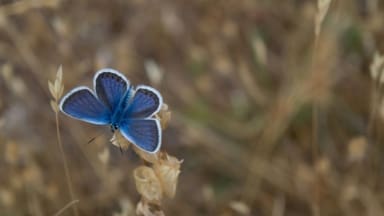
Butterflies are one of the best monitored groups of animals in the UK – the UK Butterfly Monitoring Scheme (UKBMS) began in 1976 and is one of the world’s longest-running insect monitoring schemes. The UKBMS is led by Butterfly Conservation, the UK Centre for Ecology & Hydrology (UKCEH), British Trust for Ornithology (BTO) and the Joint Nature Conservation Committee (JNCC). The scheme records data on over 3,000 sites per year and the resulting dataset is a crucial resource for understanding long- and short-term changes in butterfly populations, including natural annual fluctuations due to the weather, and longer-term trends driven by human activity.
The 2023 results present butterfly population trends from 1976 to 2023 at a UK level for 58 of the 59 regularly occurring species. The findings for 2023, show an overall “mixed” picture. Around half of species at monitored sites had a better than average year, while the other half were below average, with 2023 ranking 23rd in the 48-year series. Of note are four species which had their best year on record at a UK level: Chequered Skipper, Brimstone, Red Admiral, and Large Blue; whilst two species recorded their worst year on record: Small Pearl-Bordered Fritillary and Small Tortoiseshell. The Large Blue, which recorded its best year yet in 2023 following its reintroduction to the UK after becoming extinct in the 1970s.
Dr Richard Fox, Head of Science at Butterfly Conservation, said: “Butterfly numbers fluctuate naturally from year to year, largely due to the weather, but the long-term trends of UK butterflies are mainly driven by human activity, including habitat damage and destruction, pesticide use, pollution and climate change. By monitoring long-term butterfly trends we can learn about the impact of climate change and other factors on our native wildlife”.
Chris Tuckett, JNCC Chief Officer Strategy and Impact said: “The evidence produced through environmental monitoring, such as the UK Butterfly Monitoring Scheme (UKBMS), demonstrates the vital role these schemes play in helping us understand the effects of pressures on the natural environment and, equally importantly, how efforts to address these pressures through nature conservation and recovery can be effective in reversing decline. JNCC has supported these schemes, which involve thousands of dedicated volunteers, for over 30 years, and remains committed to continuing to support them in the future.”
The data for the scheme is collected by thousands of dedicated volunteers, without whom this invaluable dataset would not be possible to generate or maintain. The UKBMS partners are incredibly grateful to each and every volunteer for their contribution.

